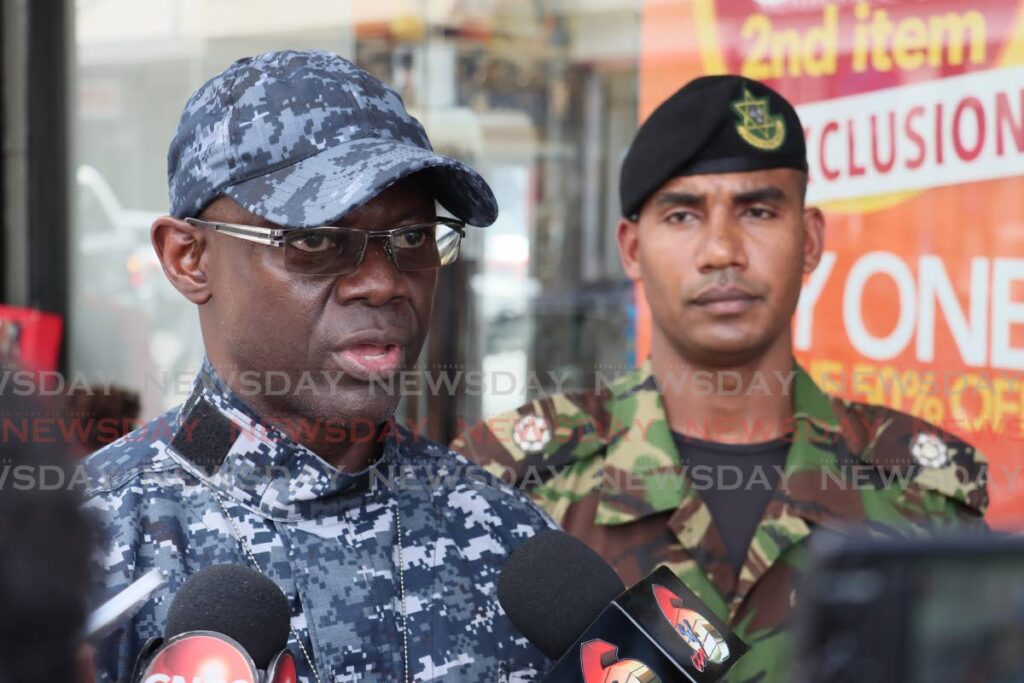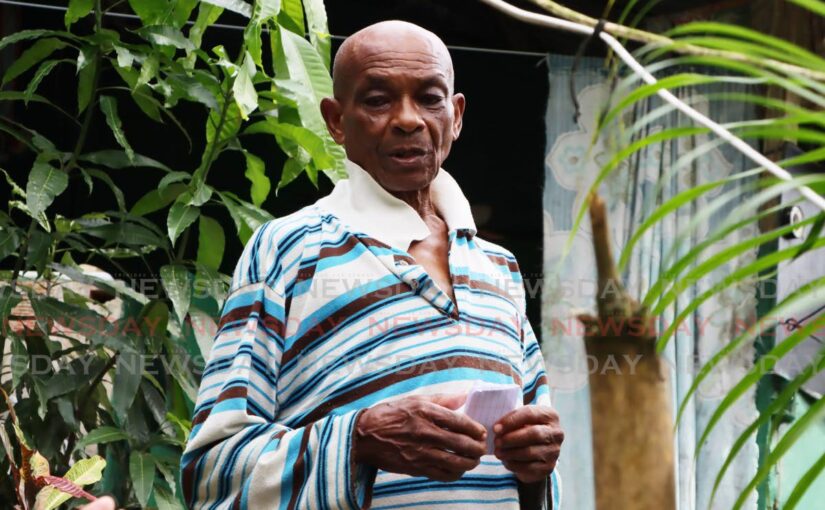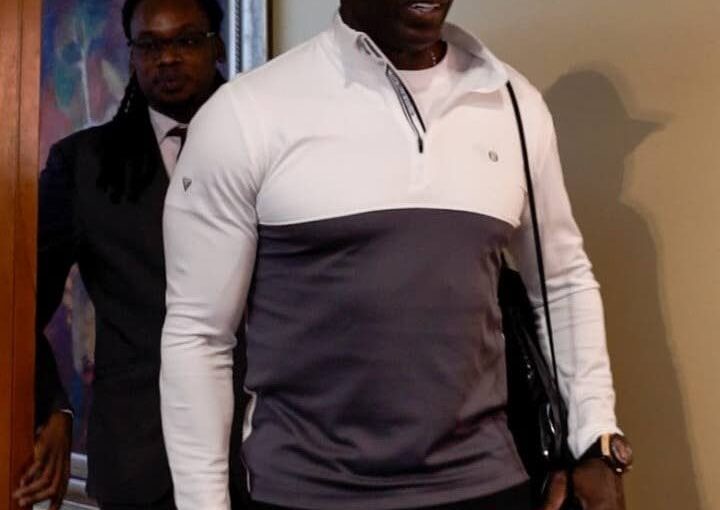

Gideon Dickson, president of the Police Service Social and Welfare Association, says police officers will stop attending court if they are not allowed to take their service weapons into the courtroom. -
HEAD of the Trinidad and Tobago Police Service Social Welfare Association (TTPSSWA) Gideon Dickson says his officers will not put down their guns when going to court despite calls from the TTPS leadership to do so.
He made the comment after a police officer and a court employee clashed over the Judiciary's policy to prohibit anyone with a firearm from entering a court on November 6.
The Judiciary, in a press release on November 8, said an officer went to the O’Meara Judicial Complex and, after refusing to comply with the rules, was refused entry.
The incident escalated and the officer threatened to arrest the court employee.
The Judiciary defended its policy on the exclusion of guns from courtrooms in the release.
>
Judiciary policy states court users and police are prohibited from entering the court premises with a firearm.
The Judiciary said its policy, which has been in existence for almost a decade, is in line with international best practice.
“The Judiciary established a screening policy in July 2015, which is in keeping with international best practice for court buildings and is in keeping with security protocols in many sectors across TT and internationally where police officers must also be screened.”
It added its position was formally communicated to various stakeholders, including the Law Association of TT and every police commissioner who has been in office since the policy’s implementation.
“The Judiciary continues to engage in discussions with the leadership of the TT Police Service (TTPS) to ensure there is common understanding of this policy position on the exclusion of firearms from court buildings. “Despite this policy, the Judiciary continues to encounter issues from certain officers of the TTPS, whose actions deliberately disregard this policy.”
The Judiciary said it remains focused on safeguarding its employees and court users, who are unduly affected.
It said a collaborative approach is taken when special measures are required but added while it recognises the important role played by officers of the TTPS in providing public safety and security, it reserves the right to regulate access to all court premises.
Dickson: Judiciary setting up police
TTPSSWA president Gideon Dickson said the release does not address police officers' concerns about their safety.
>
He said the Judiciary’s policy is placing officers in a precarious position.
“The only persons assembling in any courthouse are the criminals and the police. And you are saying let the officers put down their tool of trade to go there with the people they have brought before justice.
“You don't need any academia to see that this is creating a volatile situation for your first and last line of defence.
“As it relates to criminal elements, you are setting us up. You are telling us to go and lodge our firearms in our station and travel to the court and travel back and pick up our firearm and then continue on. What is to stop any associates of those criminals we lock up from targeting us during that period?”
He said officers will not be going to court if they have to put down their guns.
He added until the situation is resolved if officers are refused entry to the court, they should return to the station and make an entry in the station diary, noting who they engaged and that they were present for the matter but through no fault of their own, were unable to give a further contribution.
However, Deputy Commissioner of Police Junior Benjamin called on officers to comply with the Judiciary’s policy until a compromise can be agreed upon between the police commissioner and the chief justice.
“There is a level of collaboration that takes place with the commissioner and the chief justice, and this would be an issue that would be at least talked about, and we will come to an understanding that benefits both parties.
“We are hoping that officers would do the right thing and understand our purpose and we will fulfil our mission.
>
“In spite of the difference of the association and understanding what they are saying, we believe that constant dialogue and collaboration is what is needed to deal with situations like these as we go forward.”
Dickson accused the Judiciary of trying to create a policy that supersedes the law.
He noted Section 8 of the Firearms Act explicitly gives police officers and soldiers the ability to carry a gun in court and Parliament.
“We will not be doing anything that is against the law. The Judiciary’s policy is just that: policy. It speaks nothing to the law and we are just standing on what the law says.”
Dickson said a solution could be allowing the TTPS to secure the court.
He added in that scenario officers could then lodge their guns when entering the court and retrieve them when leaving.
DCP Benjamin: Court security procedures 'robust'
Asked about public safety in the courthouse, given the number of criminals in the building, Benjamin said getting into the court entails numerous security procedures.
“People don't just walk in. There's a robust process to get into the court. Even in terms of the prisoners, there is best practice that is followed. When they leave the prison, they are well searched, then they are searched again (when they arrive at the court).
>
“Then when they come into the court, they are searched again. So there are several different strainers to ensure that prisoners who are coming into the court are not coming in with any sort of weapons.”
Benjamin added even in the event of an attack on the building, the presence of armed officers could escalate the situation.
DCP Junior Benjamin is calling on police officers to comply with the Judiciary's policy to not bring their guns into courtrooms. -
“If something like that happens and you have police with weapons there and they overpower the police with the weapons, then it becomes even worse. So best practice would really show it's not even better to have weapons within the precincts of the court.”
Dickson, in response, quipped, “Nothing does happen until it happens.”
He, however, agreed with Benjamin that more dialogue is needed on the issue.
“We are hoping that both common sense and good dialogue can bring an end to this in short order.”
Objections to policy an ongoing issue
When asked why he was raising these objections now, Dickson said the safety concerns caused by the policy since its implementation in 2015 have been ongoing.
>
On July 26, guards from the Maintenance and Training Security Company (MTS) at the Princes Town Judicial Complex blocked an armed police officer from entering the court.
The Judiciary, in a statement after that incident, said, "This is not the first time that Judiciary security personnel have encountered this issue with this TTPS officer and formal complaints were lodged."
On November 19, 2019, a senior police officer from the Eastern Division said police officers were objecting to being frisked by MTS guards when entering Sangre Grande Magistrates Court.
The officer told Newsday, “I would honestly like to know what they are looking for. It’s as if they are treating us like we are in kindergarten."
In 2015, tempers flared at the Arima Magistrates' Court when police officers were blocked from taking their firearms in court.
The Judiciary, in a statement, said it had been the practice for several years that “people entering court buildings, including members of staff, are scanned in an effort to limit the entry of dangerous weapons and thereby ensure the protection of all court users.
It said it had also considered statistics when before arriving at its position.
"These statistics reveal that the majority of shootings within court buildings and courtrooms occur with firearms wrested by perpetrators from the control of police officers."





